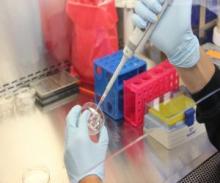Tissue-material interactions govern the efficacy of biomedical devices implanted in the body. Protein adsorption that occurs on a biomaterial surface influences cell action on those surfaces in vitro and in vivo, including but not limited to the innate immune response cells (neutrophils ,monocytes and macrophages) which are essential in driving the body's early response to a b1omaterial, and other cells such as endothelial cells, fibroblast, smooth muscle cells, stem cells, etc. There is a need for elastomeric materials in the biomaterials field which are degradable and have an ability to interact with proteins in a manner that favors wound healing. A novel finding of this invention was the observation that specific formulations of a degradable, polar hydrophobic ionic polyurethane (0-PHI) system synthesized by Santerre et al. has demonstrated good biocompatibility by means of protein adsorption related to immunoglobulin proteins and specifically immunoglobulin G (lgG). This will have applications for the use of biomaterials in sensors, implant scaffolds, tissue repair fillers and numerous other blood and tissue contacting devices.
Marilee Krinsky
Innovations & Entrepreneurship Manager
Innovations & Partnerships Office (IPO)
(416) 978-2514





